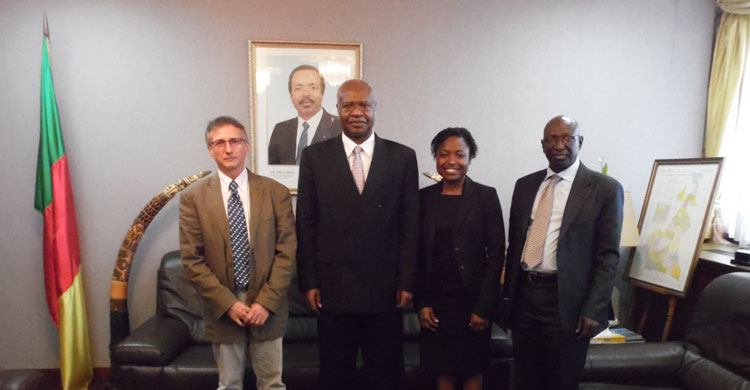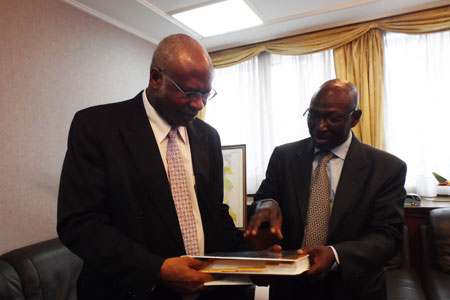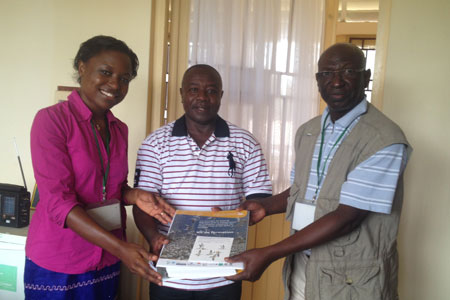Talks with Cameroon Government and Wildlife Institutes Promote Accession to AEWA and Capacity-Building for Conservation Training

The AEWA and TSU Team meet with the Prime Minister and Head of Government of Cameroon, H.E. Mr. Philemon Yang.
Yaoundé, Cameroon June 2014 - A series of AEWA-related meetings – undertaken by the Technical Support Unit (TSU) and the Coordinator of the African Initiative of AEWA - took place in Cameroon from 9 to 17 June 2014 with the aim of building capacity for conservation training and promoting the country’s accession to AEWA.
Consultations with the Garoua Wildlife College
The week of meetings with Cameroonian stakeholders started with representatives of the Technical Support Unit (TSU) to the African Initiative of AEWA undertaking a field mission to the Garoua Wildlife College from 9 to 13 June 2014. The college plays a central role in developing key competencies in wildlife management throughout the continent, in particular in providing wildlife-related training for Francophone experts in sub-Saharan Africa.
On behalf of the TSU, Dr François Lamarque (Ministry of Ecology, Sustainable Development and Energy, France) and Mr Abdoulaye Ndiaye (Department of National Parks, Senegal) had in-depth discussions with college representatives exploring the possible incorporation of the training on Flyway Conservation using the Flyway Training Kit (FTK), as well as the training kit on waterbird identification and survey developed by the French National Office for Hunting and Wildlife (ONCFS) into the curriculum of the college. Garoua Wildlife College, which is currently updating its curriculum under the supervision of its new Director, Dr. Bobo Kadiri Serge indicated its keen interest, and follow-up discussions will thus focus on concrete action. The college’s requirements for field materials related to waterbird surveying as well as existing gaps were also discussed, and the TSU will strive to address these needs.
Improving the capacity of different target groups to implement AEWA constitutes a core theme of the AEWA Plan of Action for Africa. One of the plan’s highest priority activities is the incorporation of the FTK into the curricula of at least five wildlife training institutions in Africa, such as the Garoua Wildlife College which is explicitly mentioned in the Plan of Action for Africa as a key training institute in francophone West and Central Africa.
Accession-related meetings with the Cameroon Government

From 16 to 17 June 2014, the TSU team was joined by Ms Evelyn Moloko, who represented the UNEP/AEWA Secretariat as Coordinator for the African Initiative. Through talks with high-level government officials, this second part of the mission, in the country’s capital Yaoundé, focused on the promotion of Cameroon’s accession to AEWA. The joint AEWA and TSU team met with Cameroon’s Prime Minister, H.E. Mr Philomen Yang, as well as the Secretary General at the Ministry of Forestry and Wildlife, Mr Koulagna Koutou Denis and the Assistant Director for Hunting and Wildlife, Dr Linjouom Ibrahim.
Discussions highlighted the country’s ecological and socio-economic importance for migratory waterbirds, as well as the different ways in which Cameroon could benefit from joining AEWA as a Contracting Party. The government confirmed its great interest in acceding to AEWA and its commitment to push forward the accession process. The next steps of the accession process were debated, and the outcomes and prospects related to the visit to Garoua Wildlife College presented. A visit to Mbalmayo School of Water and Forestry concluded the mission.
During their visit to Cameroon, the AEWA and TSU representatives also met with the Ramsar National Focal Point for Cameroon, Mr Serge Hervé Ondoua of the Ministry of Environment, Nature Protection and Sustainable Development, in order to discuss collaboration in implementing AEWA and the Ramsar Convention, and exchange experience including on accession-related questions.
Other key potential partners which the joint AEWA and TSU team was able to meet included the French Development Agency, the service responsible for cooperation and cultural activities at the French Embassy, the Senegal Embassy in Cameroon, the Wildlife Conservation Society, the Regional Wildlife Trade and Monitoring Network office and the Cameroon Wildlife Conservation Society which is currently responsible for the national coordination of the International Waterbird Census in Cameroon.
Background information

The AEWA Plan of Action for Africa 2012-2017 - A guide to the implementation of the AEWA Strategic Plan 2009-2017 in the African Region is an operational guideline for the implementation of the African Initiative, over a period of seven years. The plan was developed through a highly consultative process involving the African Contracting Parties to AEWA, other AEWA Contracting Parties and a wide range of stakeholders working on waterbird conservation in the African region. The plan was adopted at the 5th Session of the Meeting of the Parties to AEWA in 2012. It identifies a variety of concrete actions in order to help translate the objectives of the AEWA Strategic Plan 2009-2017 into tangible results on the ground.
The Technical Support Unit is a team of experts supporting the implementation of the AEWA Plan of Action on the ground at the sub-regional level. This support mechanism, offered by the Government of France, was confirmed by AEWA Resolution 5.9 on the Implementation of the African Initiative for the Conservation of Migratory Waterbirds and their Habitats in Africa. It is composed of representatives from two countries (Senegal and France) and four technical Partners (the Direction of National Parks (DPN), Senegal; the Direction of Water and Biodiversity (DEB), France; the Tour du Valat research centre, France; and the French hunting and wildlife agency (ONCFS).
The Flyway Training Kit is a unique training resource on the flyway approach to the conservation and wise use of waterbirds and wetlands. It was developed under the UNEP/GEF African-Eurasian Wings Over Wetlands Flyway Project (WOW project) following an in-depth analysis of the knowledge gaps and training needs for waterbird and wetlands conservation in the AEWA region. This training kit consists of three modules aimed at improving the implementation of AEWA and the Ramsar Convention by different target groups in different aspects at the national level, while focusing on the flyway approach. In addition to serving as a pedagogic tool, the FTK is intended principally for conducting Training of Trainer courses (ToTs), which aim to equip trained persons with the necessary skills for conducting similar training courses at the national and regional levels.
The ONCFS Training Module on Waterbird identification and surveying in Africa is a toolkit which serves as an educational resource as well as a tool for conducting training on the delivery of training courses for waterbird identification and waterbirds counting in Africa. It is currently available in Arabic, English and French, while a Portuguese version is currently under development. The tool kit is also available in two versions – one specific to Northern African and the second for Sub-Saharan Africa. The AEWA Plan of Action for Africa promotes the use of this tool for improving the capacity for waterbird survey and monitoring in the African region.
For more information on this story, please contact Ms Evelyn Moloko or Ms Birgit Drerup.
By Evelyn Moloko.
Last updated on 09 October 2014


